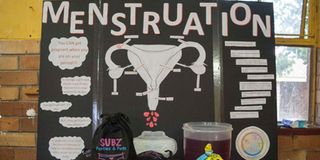Period poverty must be a 2022 campaign issue

A poster used to educate girls about menstruation and female reproductive system.
What you need to know:
- Period poverty is part of the nation’s growing health burden.
- If one week is lost in school and work each year to periods, 12 weeks are lost in a year.
The 2010 Constitution of Kenya included economic, social, and cultural rights for the first time in its Bill of Rights. The right to the “highest attainable standard of health, which includes the right to health care services including reproductive health care” is guaranteed for all Kenyans.
Menstrual health is a pivotal part of reproductive health care, which is why the current demographic profiles, placing Kenya as having over 14 million women and girls aged between 15 and 49 should be significant.
These people are firmly in the reproductive age, and can be assumed to have some interaction with a menstrual cycle in one way or another, alongside thousands of trans, intersex and gender diverse persons. Two out of three of these millions lack access to proper menstrual products like pads, tampons or menstrual cups. This forces them to use unhygienic cloth rags, old mattress pieces, socks and more. Beyond this, most of them have to miss school and work because of the inability to move around in a functional way due to the week-long incontinence of blood flow during this time.
Current government solutions still leave a huge gap to be bridged when one of the objectives of the Menstrual Hygiene Management (MHM) policy 2019-2030 is to ensure women and girls have access to safe and hygienic menstrual products, services and facilities. Additionally, the Basic Education (Amendment) Act No. 17 of 2017 addresses the importance of access to free menstrual products for girls in learning institutions. With many of these directives and policies being partially implemented, a desperate situation that puts needy girls at risk of exploitation continues.
Unwanted sexual relations
Many, especially those aged 15 to 24, find themselves coerced into unwanted sexual relations with people who have more resources than they do in exchange for the essential items. This escalates the risk of teen pregnancies, and of contracting HIV and other sexually transmitted illnesses as they are not able to negotiate for protected sex in these inequitable circumstances.
Period poverty is part of the nation’s growing health burden. Its effect on the majority of the nation means that it is long past being a marginal “gender” issue and its continued neglect is a crime against the wider electorate.
We, therefore, cannot continue to discuss period poverty only by woman reps during their campaigns. This issue must be brought up by all campaigners, and men must increasingly be at the forefront of finding quick, urgent and real implementations to this matter considering that they take up the lion’s share of leadership opportunities, thus making the lion’s share of decisions about how public resources are spent. This makes their current non-participation in this discussion inexcusable.
If one week is lost in school and work each year to periods, 12 weeks are lost in a year, the equivalent of our annual cumulative school holidays. All campaigning male politicians must thus centralise period poverty.
Ms Okore is a policy analyst. [email protected]





